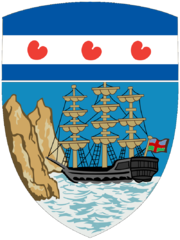Human Rights Act (South Sea Islands)

| |
| Original Title: | Human Rights Act (South Sea Islands) |
| Jurisdiction: | South Sea Islands |
| Ratified: | August 23rd 1687 |
| Date effective: | August 23rd 1687 |
| Purpose: | Human Rights declaration. |
| Amendments: | None. |
The Human Rights Act (South Sea Islands) is a legislative act of the Government of the South Sea Islands that received Royal Assent by the Lieutenant Governor on August 23rd 1687. Entering into force immediately upon its ratification, the act is seen as codifying common legal principles and social conventions that have long been held in the South Sea Islands.
Text of the Act
Preamble
Whereas, the people and government of the South Sea Islands recongise that the inherent value, dignity and inalienable rights of all human beings is the foundation of democracy and liberty.
Acknowledging, that the failure of nations to adhere to these principles has resulted in grievous harm being inflicted upon countless generations.
Believing, that it is inherently desirable that Micras be a planet where freedom from fear, want and tyranny is universal. Understanding, that to avoid the necessity of rebellion against oppression, human right should be a common recourse for all peoples.
Resolving, that the government and people of the South Sea Islands shall proclaim this human rights act to be the common standard for all Micran nations and peoples.
Resolving, that this declaration must be held constantly in mind, and direct the actions and contrivances of South Sea Islanders at every level of society and government.
Article one: Inherent Rights
Every human being is born with innate conscience and reason, and all shall be considered free, equal and in possession of inherent and inalienable rights for the duration of their lives.
Article two: Application of the Declaration
The rights set out in this declaration shall be applied equally to all human beings without distinction of any kind, including distinctions based on race, gender, ethnically, sexuality, age, economic status, nationality, language, political opinion, religion, country of birth or other status.
Article three: Right to Life
All human beings are endowed with the right to life and security of person.
Article four: Freedom from Slavery
No human being shall ever be held in a state of slavery or servitude, and all human beings are endowed with the responsibility to deliver subjected beings from their intolerable condition.
Article five: Arbitrary Arrest
No one shall be subjected to arbitrary arrest, detention or exile, and all human beings shall be entitled to the expedient and competent resolution of legal proceedings undertaken against them.
Article six: Prohibition of Torture
No human being shall be subjected to torture or cruel or unusual punishment, without exceptions or distinctions of any kind. Likewise, no human being shall be subjected to degrading or inhumane treatment at any time.
Article seven: Legal Detention
Those legally detained on suspicion of breaching criminal law shall be presumed innocent until proven guilty, and treated in a manner befitting that status. As soon as is expedient, those so suspected shall be entitled to trial by a free, independent and impartial tribunal. Those imprisoned following a free and independent trial shall not have their rights infringed or compromised during their detention.
Article eight: Personal Rights
Everyone has the right to freedom of thought, religion, opinion, expression and peaceful assembly. Likewise, all adults shall be entitled to participate in the governance of their country, either directly or through freely chosen representatives.
Article nine: Employment Rights
All human beings have the right to seek employment and, once employed, have the right to pay and conditions that are determined solely based on merit and not on any other factors.
Article ten: Living Standards
Everyone has the right to a standard of living that is adequate for their own health and wellbeing, as well as for the health and wellbeing of their dependants. This includes reasonable protection against unreasonable working hours, and the allowance of leisure time.
Article eleven: Personal Development
All human beings have the right to an education, participation in the cultural life of their community, and the right to start and have a family.
Article twelve: Responsibilities
In the exercise of their own rights and freedoms, every human being shall be subject only to limitations determined by law for the purpose of securing the rights and freedoms of others and of meeting the requirements of the general welfare of a democratic society. Every human being is endowed with the responsibility to ensure that, in their exercising of their own rights, they preserve and promote the rights of others.
Ratification
This act is hereby ratified by the Legislative Assembly of the South Sea Islands, and enacted into law by the application of the Lieutenant Governor's signature on behalf of His Royal Majesty the King.
G.Middlemore, August 23rd 1687